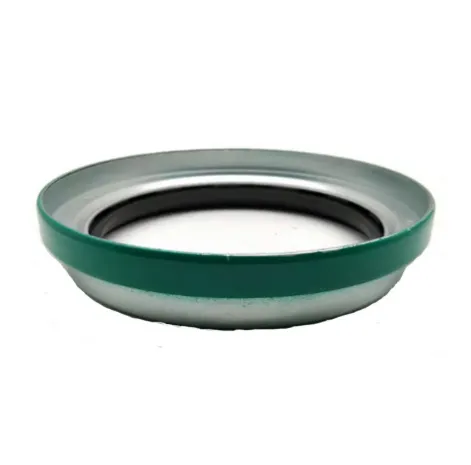Essential Guide to Oil Seals: From Radial to Metal-Cased Seals for Industrial Reliability
Oil seals are critical components in mechanical systems, serving as protective barriers to retain lubricants and prevent contamination. Whether in automotive gearboxes or heavy machinery, selecting the correct seal design and material is vital for equipment longevity and performance. Among the various types, radial oil seal, metal oil seal, single lip oil seal, gearbox oil seal, and metal cased oil seals each serve specific functions based on application demands. This article explores these important oil seal types and how they ensure effective sealing in industrial and automotive systems.

Radial Oil Seal: The Backbone of Rotational Sealing
A radial oil seal also known as a shaft seal or rotary shaft seal, is designed to seal the space between a rotating shaft and its housing. It prevents oil or grease from leaking out of the system while simultaneously blocking contaminants like dirt and water from entering.
Key features of radial oil seals include:
Dynamic sealing capabilities: Ideal for rotating shafts in engines, pumps, and motors
Versatile materials: Commonly made from nitrile rubber (NBR), fluorocarbon (FKM), or silicone for various temperature and chemical resistance levels
Application-specific designs: Available in single lip or double lip configurations for different environments
Radial oil seals are used in a wide range of industries, including automotive, manufacturing, marine, and agriculture. Their ability to maintain lubrication and exclude harmful contaminants makes them essential for efficient operation and reduced maintenance costs.
Metal Oil Seal and Metal Cased Oil Seals: Strength and Durability
For applications requiring superior strength and heat resistance, metal oil seals and metal cased oil seals offer a robust solution. These seals are typically reinforced with steel or other metal casings to provide structural rigidity and resist deformation under pressure.
- Metal Oil Seal
A metal oil seal is a heavy-duty seal used in applications exposed to extreme heat, high pressure, or corrosive fluids. These seals are often found in industrial machinery, heavy equipment, and high-speed rotating applications.
Advantages of metal oil seals:
Improved structural integrity under demanding operating conditions
Enhanced heat and chemical resistance compared to all-rubber seals
Longer service life in rugged environments
- Metal Cased Oil Seals
Metal cased oil seals are a specific type of metal oil seal where the outer diameter is fully encased in a metal shell. This design ensures a tight, press-fit into the housing and better stability.
Benefits of metal cased oil seals:
Superior housing retention, especially in high-vibration systems
Resistance to installation damage
Precision fit, ideal for tight-tolerance applications like gearboxes and industrial motors
Commonly used in automotive engines, machine tools, and gear reduction units, metal cased oil seals deliver dependable performance in environments where reliability is non-negotiable.
Single Lip and Gearbox Oil Seals: Specialized Sealing Solutions
Different operational environments require different sealing features. Single lip oil seal and gearbox oil seal are two examples of seals tailored for specific functions.
- Single Lip Oil Seal
A single lip oil seal is a basic yet highly effective sealing solution featuring one sealing lip. It is designed primarily to retain lubrication and is best suited for clean environments with minimal contamination risk.
Features of single lip oil seals:
Low friction and wear due to reduced contact area
Cost-effective for low- to medium-demand applications
Simple installation and reliable operation
These seals are often used in pumps, electric motors, and small gearboxes where dust and moisture exposure is minimal. While they offer good performance in clean settings, for dirty or outdoor environments, a double lip seal or additional dust lip may be required.
- Gearbox Oil Seal
A gearbox oil seal is specifically designed for sealing the rotating shafts in gearboxes, preventing transmission oil from leaking and contaminants from entering the system.
Key requirements of gearbox oil seals include:
High resistance to pressure and temperature caused by continuous operation
Compatibility with synthetic lubricants and transmission fluids
Durable construction to handle shaft misalignment and vibration
Gearbox oil seals may come in both rubber and metal cased oil seal varieties depending on the type of gearbox and operational load. In both manual and automatic gearboxes, these seals play a vital role in protecting internal gears and bearings.
Choosing the right seal—whether it's a radial oil seal, metal oil seal, single lip oil seal, gearbox oil seal, or metal cased oil seals—is crucial for system integrity and efficiency. Each type is designed to meet specific environmental and mechanical demands, offering unique advantages in sealing, durability, and performance. Understanding the function and features of each seal allows engineers, mechanics, and maintenance professionals to optimize machinery life, minimize downtime, and ensure safe, leak-free operation. In any industry where moving parts and lubricants are involved, investing in quality oil seals is a small decision that delivers big results.
-
High-Quality Seal 12x22x5 for Industrial & Automotive Use | YJM Seal
ニュース Nov.25,2025
-
Seal 12x20x5: Precision Radial Shaft Seals for Industrial Reliability
ニュース Nov.24,2025
-
Seal 12x18x5: Essential Guide to Specifications, Applications & Vendors
ニュース Nov.24,2025
-
Understanding Seal 12 20 5: Applications, Specifications & Industry Insights
ニュース Nov.23,2025
-
Durable Oil Seal 85x110x12 – Reliable Sealing Solutions for Industry
ニュース Nov.23,2025
-
Durable and Precise Oil Seal 75x95x10 for Efficient Machinery | YJM Seal
ニュース Nov.22,2025
-
Durable Oil Seal 75x100x10 for Reliable Industrial Performance | YJM Seal
ニュース Nov.22,2025
製品カテゴリー















